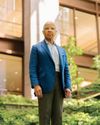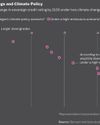
America’s longest-serving secretary of state, Cordell Hull, is best known for winning the Nobel Peace Prize for his role in establishing the United Nations at the end of World War II. Today, 75 years later, another important piece of his legacy looks increasingly at risk as President Donald Trump realigns the U.S.’s relationships across the globe.
Hull helped create the modern global trading system that eventually led to the advent of the World Trade Organization in 1995. He viewed tariff battles as a threat to international peace and advocated for unconditional trade liberalization among nations. Indeed, he considered barriers to the exchange of goods and unfair economic competition as synonymous with war.
Hull’s vision is running aground on the shores of Lake Geneva at the WTO’s headquarters in Switzerland. Under Trump, the U.S. is weaponizing tariffs and has effectively neutralized the organization’s dispute- settlement function at the very moment when global trade arbitration is needed most.
Some economic historians fear that the new chapter of rising protectionism has led to an existential moment for the WTO. “Cordell Hull would be fretting over the state of the debate,” says Douglas Irwin, an economist at Dartmouth College whose book Free Trade Under Fire is being updated for 2020. “He would be very concerned about the deterioration of the WTO system, as he worked hard to replace a power-politics, law-of-the-jungle approach to trade in the 1930s with the rule-of-law approach that was capstoned in his time.”
Hull’s beliefs helped pave the way for Western nations to sign the General Agreement on Tariffs and Trade, or GATT, in 1947. The accord sought to lower import duties and was an unparalleled success. Setting the rules for world trade, it reduced average tariff levels among its participants to 5%, from more than 20%, over its lifetime.
This story is from the February - March 2020 edition of Bloomberg Markets.
Start your 7-day Magzter GOLD free trial to access thousands of curated premium stories, and 9,000+ magazines and newspapers.
Already a subscriber ? Sign In
This story is from the February - March 2020 edition of Bloomberg Markets.
Start your 7-day Magzter GOLD free trial to access thousands of curated premium stories, and 9,000+ magazines and newspapers.
Already a subscriber? Sign In

See Which Countries Are Falling Behind On Climate Change
Under the Paris Agreement, 190 countries and the European Union pledged to take steps to hold the global temperature rise to less than 2C (3.6F) from preindustrial levels—and preferably 1.5C.

Billionaires Vie for the Future of Brazilian Finance
An escalating battle between two billionaires is upending the financial community in São Paulo, Latin America’s wealthiest city.

Ford Foundation's Darren Walker: ‘We Have to Get Uncomfortable'
DARREN WALKER, 62, disrupted his Wall Street life more than 25 years ago when he left what is now UBS Group AG to volunteer at a school and eventually pursue a career in community development and philanthropy. Since 2013 he’s been at the pinnacle of the philanthropic world as president of the Ford Foundation, created by the family of automaker Henry Ford during the Great Depression to advance human welfare.

Fueling the Ener Transition
I MAY BE BIASED, but some of the most important research and data on the Bloomberg terminal lies in one of its lesser-known functions: {BNEF }

Dig Into Analysts' Estimates for Disruptive Companies
THE PANDEMIC ERA generated a whole wave of disruptive companies as it accelerated the introduction of new products and services in areas including artificial intelligence, digitization, electronic payments, online meeting platforms, and virtual currencies.

Climate Risks Come for Sovereign Credit
FOR YEARS climate scientists have warned about the ferocious wildfires and hurricanes that are now overwhelming many communities. Today alarms are ringing about a related financial danger: risks lurking within government bonds, the biggest part of the global debt market.

Responsible-Investing Pioneer Lydenberg Says ESG Needs An Upgrade
STEVE LYDENBERG’S passion for social change was inspired by anti-Vietnam War demonstrations, consumer boycotts, and the movement to divest from apartheid South Africa. But he didn’t take to the streets. Instead, Lydenberg turned to the world of finance to help catalyze societal change.

Engine No. 1's Grancio: ‘People Will Appreciate an Economic Argument'
ENGINE NO. 1 sent shock waves across corporate America in May when the fledgling investment firm won a boardroom battle with Exxon Mobil Corp., securing three seats on the oil and gas giant’s board after purchasing only about $40 million of its stock.

Find Out Which Companies May Ramp Up Payouts After Covid
AS THE PANDEMIC DISRUPTED business last year, many companies cut or suspended dividends. Which will boost their payouts when economies pick up again?

Get Into the Minds of Central Bankers as They Navigate Shocks
HAVE YOU EVER WONDERED how central bankers forecast the impact of shocks on the economy?